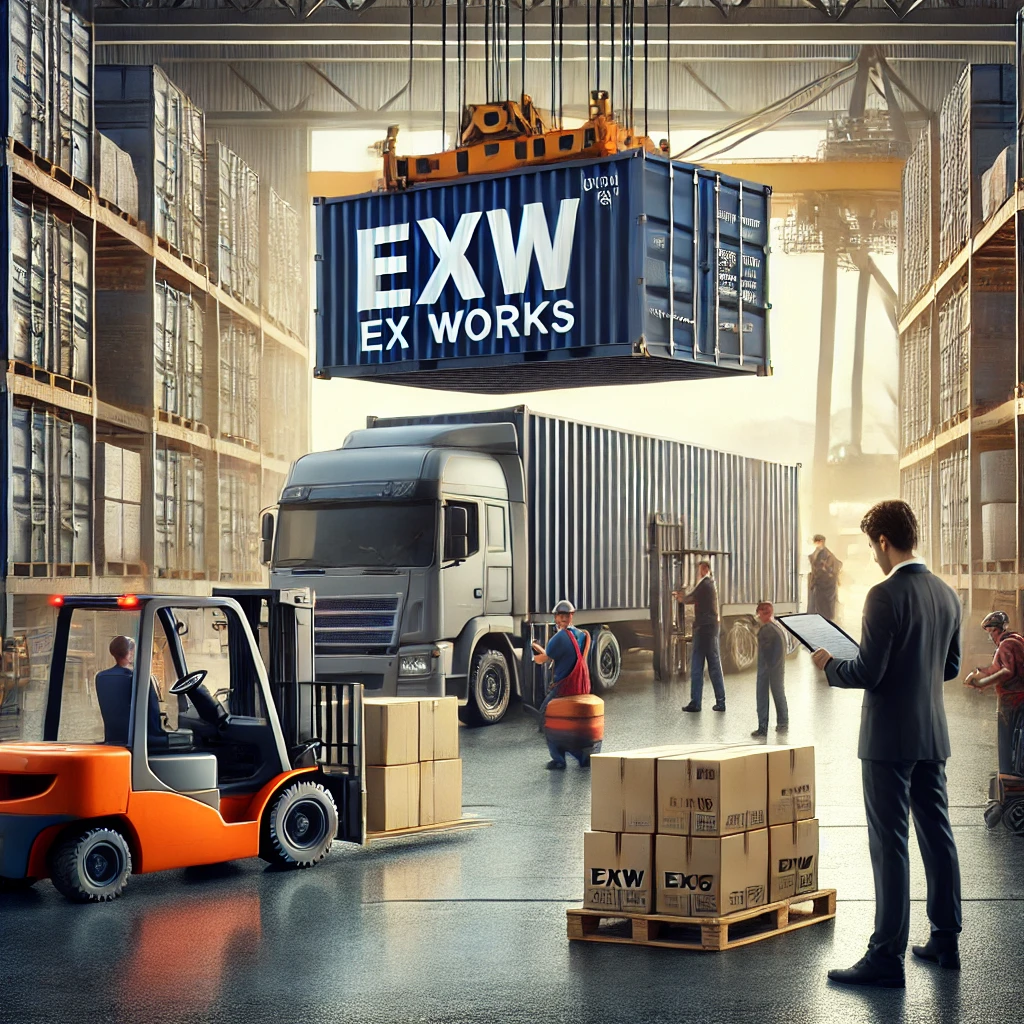Exploring EXW Shipping in Detail
But what does EXW shipping mean? How does it impact your business?
In this guide, we will break down everything you need to know about EXW shipping, including its key features, advantages, disadvantages, and practical applications in global trade. 🚢📦

What Is EXW Shipping?
EXW (Ex Works) is an Incoterm that defines the responsibilities of buyers and sellers in an international trade transaction. Under an EXW agreement, the seller’s only obligation is to make the goods available for pickup at their factory, warehouse, or another agreed location.
The buyer assumes full responsibility for the shipment, including:
✔ Transporting the goods from the seller’s premises to the final destination.
✔ Covering all costs for shipping, freight, and insurance.
✔ Handling export and import customs clearance.
✔ Managing any risks once the goods are picked up.
💡 Example: A company in Germany buys goods from a supplier in China under EXW terms. The Chinese seller makes the goods available at their warehouse, but the German buyer must arrange pickup, export formalities, international shipping, customs clearance, and final delivery.
Key Features of EXW Shipping
✅ Seller’s Responsibilities Under EXW
✔ Makes the goods available at the agreed pickup point.
✔ Ensures the goods are properly packaged and labeled for transport.
✔ Provides necessary commercial documents (invoice, packing list).
✔ Does NOT cover export clearance, shipping, or customs duties.
✅ Buyer’s Responsibilities Under EXW
✔ Arranges for pickup and transportation from the seller’s location.
✔ Handles export documentation and clearance.
✔ Pays for freight, insurance, and import duties.
✔ Takes on all risks and costs once the goods leave the seller’s premises.
✅ Best Use Cases for EXW
✔ When the buyer has better logistics connections and lower shipping rates.
✔ When the buyer wants complete control over transportation and costs.
✔ When the seller prefers to avoid handling export customs and logistics.

Advantages & Disadvantages of EXW Shipping
📈 Advantages for the Seller
✔ Minimal Risk & Responsibility – The seller’s role ends once the goods are made available.
✔ No Need to Arrange Shipping – No responsibility for transport or customs clearance.
✔ Faster Processing – Buyers can pick up goods on their schedule.
📉 Disadvantages for the Seller
❌ Less Competitive for International Buyers – Many buyers prefer sellers who arrange shipping.
❌ Delays if Buyers Take Longer to Pick Up – Storage fees may apply if goods aren’t collected on time.
📈 Advantages for the Buyer
✔ Full Control Over Shipping Costs – The buyer selects the best freight forwarder and transportation method.
✔ Flexibility in Logistics – Buyers can negotiate better rates and optimize shipping routes.
✔ Better Customs Control – Buyers handle their own export/import procedures.
📉 Disadvantages for the Buyer
❌ High Responsibility & Risk – Buyers manage the entire shipping process.
❌ Additional Costs for Export Clearance – If the seller is unfamiliar with export regulations, costs may increase.
❌ More Paperwork & Logistics Complexity – Requires experience in customs, documentation, and transportation.
EXW vs. Other Incoterms: How It Compares
Incoterm | Who Arranges Transport? | Who Covers Insurance? | Risk Transfer Point | Best For |
EXW (Ex Works) | Buyer | Buyer | At the seller’s warehouse | Buyers with strong logistics networks |
FOB (Free on Board) | Seller (until port) | Buyer | Once goods are on the ship | Common in sea freight |
CIF (Cost, Insurance, and Freight) | Seller | Seller | Once goods arrive at destination port | Buyers wanting insurance included |
DDP (Delivered Duty Paid) | Seller | Seller | At the buyer’s location | Buyers wanting a hassle-free shipping process |
💡 Key Difference:
✔ EXW gives buyers the most control, while CIF and DDP place more responsibility on the seller.
✔ EXW is cost-effective for experienced buyers, but can be risky for those unfamiliar with logistics.

How to Handle EXW Shipments Efficiently
If you’re a buyer managing EXW shipments, follow these steps to ensure a smooth shipping process:
1. Hire a Reliable Freight Forwarder
📦 Work with an experienced freight forwarding company to manage pickup, transport, and customs.
2. Arrange Export & Import Documentation
🛃 Ensure you have the necessary paperwork, including:
✔ Commercial Invoice
✔ Packing List
✔ Export Permits & Customs Declarations
3. Secure Cargo Insurance
🔐 Since the buyer assumes all risks, it’s highly recommended to purchase insurance to protect against damages or losses.
4. Optimize Transportation Routes
🚛 Choose the most cost-effective and time-efficient shipping method, whether by air, sea, or rail.
5. Track & Monitor Shipments
📡 Use a real-time container tracking system to monitor shipments and avoid unexpected delays.
When to Choose EXW Over Other Incoterms?
✅ Best Situations for EXW:
✔ When the buyer has strong logistics experience and can arrange shipping efficiently.
✔ When purchasing from multiple suppliers and consolidating shipments in one location.
✔ When the buyer has better access to lower freight rates than the seller.
🚫 When EXW Might Not Be Ideal:
❌ If the buyer is unfamiliar with export procedures and customs requirements.
❌ When the seller has better shipping rates, making terms like FOB or CIF more cost-effective.
❌ If the shipment involves complex logistics, such as handling dangerous goods or fragile items.

The Future of EXW in Global Trade
As logistics and supply chains evolve, EXW agreements are becoming more manageable for businesses. Future trends include:
🚀 AI-Powered Freight Solutions – Optimizing shipping routes and costs.
🚀 Blockchain for Trade Documentation – Enhancing security and transparency in customs procedures.
🚀 Autonomous Transport & Smart Warehouses – Making EXW more efficient and reliable.
Businesses that leverage digital freight technology will have a competitive advantage in handling EXW shipments smoothly.
Conclusion
EXW shipping is a widely used Incoterm that places maximum responsibility on the buyer. While it provides cost advantages and flexibility, it also requires strong logistics expertise.
✔ Best for: Buyers with experience in international trade and logistics management.
✔ Challenges: Requires handling customs, insurance, and transport coordination.
By understanding EXW agreements, businesses can reduce costs, improve efficiency, and optimize international shipping operations. 🚢📦💼
